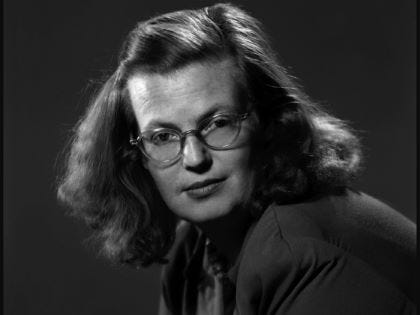Shirley Jackson: She's Gone but her Dark Fiction Lives On
What Shirley Jackson Knew About Writing Dark Fiction
Greetings Readers,
It’s getting closer to Halloween. The fall leaves in magenta, scarlet, vibrant orange, and yellow hues trigger images of pumpkins, ghouls, and devilish delights. I can’t resist reading dark fiction when I’m not indulging in Netflix’s horror movies.
This week’s post is dedicated to the legendary Shirley Jackson. She was an author who died too young, but I imagined she loved All Hallows’ Eve. She had a collection of witchcraft books on her shelves and admitted to being an amateur witch. Here’s a picture of her. Someone took it in 1940 when she was at age 24.
She was born Shirley Hardie in San Francisco, California on 14 December 1916. While attending Syracuse University, she met Stanley Edgar Hyman. The couple graduated and eloped in 1940. Once married, they lived in New York a short time, and later moved to Vermont. She was the mother of four. Unfortunately, she died from a heart attack at age 48 on 8 August 1965 but left her mark on the literary world. Shirley was known for writing horror, mystery, and gothic fiction.
Her success in writing dark stories wasn’t just about scaring the readers. It was about getting into their heads. Her tales had an uncanny ability to uncover the sinister forces lurking beneath ordinary life. Here are a few of the techniques that made her a master storyteller:
Exploring Psychological Horror
Shirley didn’t rely on ghosts and monsters to terrify her readers. The horror in her stories came from the human mind. The Haunting of Hill House is an example. It’s not the haunted house that’s scary. The protagonist’s thoughts spiral out of control and readers are privy to the inner fear. Shirley understood it takes more than a setting to frighten the fans.
Exposing the Evil in Everyday Life
One of her talents was to show how evil existed among common people. This is evident in The Lottery. In her short story, a small town becomes the backdrop for a surprising annual ritual. By rooting the evil in everyday life, Shirley Jackson forces readers to confront the truth that darkness can exist anywhere, even in what seems like a “normal” community.
The first time I read The Lottery, I had no idea how what it was about. While some people might’ve analyzed it in school, I stumbled upon it. The ending shocked me. What an unsettling and brilliant conclusion to a mysterious story.
In case you want to experience the tale for the first time, I won’t post spoilers. It’s on Amazon, but it’s also at The New Yorker and at FULLREADS. I haven’t explored FULLREADS, but they offer a free version.
Isolation and the Dangers of Alienation
Shirley had a deep understanding of how isolation can warp a person’s mind. In We Have Always Lived in the Castle, Merricat and her sister feel out of place in society. Their self-imposed exile further fuels their fear of the world. While alone, they experience a suffocating atmosphere of mistrust and paranoia.
The novel seems to mirror Shirley’s struggles with “fitting into society.” In real life, her mother was an overbearing socialite who constantly criticized her for not being the beautiful, thin daughter she wanted. During my research, I became aware she must’ve felt like a fish-out- of- water — at least in her early years. She drew from those feelings and created the work we still read.
The Power of Subtlety
The most effective way a writer can build suspense is to leave things unsaid. In many of Shirley’s stories, she withholds crucial information. She forces readers to fill in the blanks. In The Lottery, she never explains why the townspeople participate in their ritual. That question rolls around in the readers’ minds, and the horror keeps them thinking about the story. She understood fear comes from what we don’t know.
Social Norms
A lot of her fiction is centered around domestic life and the expectations placed on women. She was aware of the struggles females faced while trying to conform to gender roles, and she harnessed the tension in her stories. The Haunting of Hill House and We Have Always Lived in the Castle are not just ghost stories or thrillers. They explore the strife of oppressed women. Mixing the character’s hardship with a dose of psychological horror adds depth to the stories.
Writing Stories People Crave
It’s amazing how well Shirley Jackson’s books are selling on Amazon. For kicks, I checked the sales on Publisher Rocket. The buyers spend thousands on her work every month. I’m guessing her children or grandchildren benefit from her popularity.
What she knew about writing dark fiction made her stories famous.



